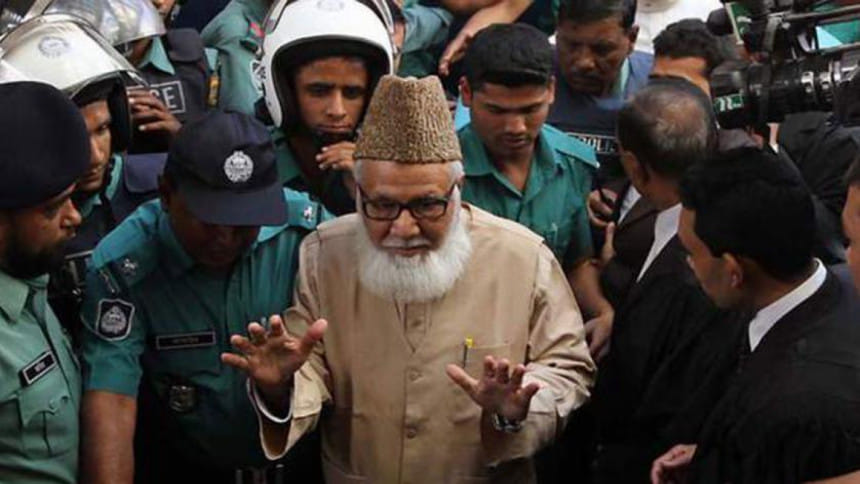One issue shouldn't cloud ties with Dhaka: Islamabad

Apparently showing their affection for war criminals being tried in Bangladesh for their crimes against humanity, Pakistan has said the relations between the two countries 'should not be clouded' with a single issue.
"Bilateral relations shouldn't be kept hostage to a single issue as it's much broader in terms of trade, culture and people-to-people contact, and should, therefore, be expanded," Pakistan Foreign Secretary Aizaz Ahmad Chaudhry told a Bangladesh media delegation at his office.
Also READ: END of NIZAMI
He made the remark amid diplomatic row between the two countries that saw summon and counter-summon of envoys in Dhaka and Islamabad following the latter's interference in Dhaka's internal affairs after the execution of war criminal and Jamaat-e-Islami chief Motiur Rahman Nizami.
"We need to make a more forward-looking approach rather than catching up the past," said the Pakistan foreign secretary when a nine-member media delegation representing print, news agency and electronic media of Bangladesh, presently visiting Pakistan, met him at the Ministry of Foreign Affairs on Friday.
The Bangladesh delegation members raised the issue of Pakistan's repeated interferences into Bangladesh's internal affairs and its attempt to present factually incorrect claims centering the trials of war criminals in Bangladesh.
The Pakistan foreign secretary said the people of Bangladesh and Pakistan are 'bound by the ties of shared history, faith and culture' and there was a need to improve relations, particularly people-to-people exchanges, student scholarships and sporting contacts.
"Our shared history and religious affinity provides a foundation to build this relationship constructively and positively," he added.
Aizaz termed Nizami's execution 'politically motivated one' and said the war crime trials are 'flawed'.
"As far as the recent trials (war crime trials) are concerned, we've made our views known. We believe these are politically motivated trials, we believe these are flawed trials targeting opposition leaders," he said.
On the other hand, India has supported the war crimes trial and said the issue is Bangladesh's internal issue.
"The issue of war crimes trial is internal to Bangladesh. It has wide popular support. India has also been supportive of a judicial process to address pending issues of retributive justice for war crimes committed during the movement for the independence of Bangladesh in 1971," said External Affairs Ministry Spokesperson Vikas Swarup after Nizami's execution.
However, the Pakistan foreign secretary said frequent references of Pakistan in the trial proceedings are also tarnishing the overall bilateral relations between the Bangladesh and Pakistan. "These trials are taking us backward, not forward," he claimed.
Referring to the 1974 Tripartite Agreement, the Pakistan foreign secretary said the government of Bangladesh had 'decided not to proceed with the trials as an act of clemency'.
However, the fact is that there was no mention in the agreement that the war criminals will continue to enjoy impunity and accordingly Bangladesh government tried the war criminals.
Aizaz said it is time for the two countries to pursue a forward-looking approach in the spirit of 'forget and forgive'.
"We believe a decision was taken consciously in the agreement of 1974. We believe Father of Bangladeshi Nation Sheikh Mujibur Rahman also expressed his desire to move on," said the Pakistan foreign secretary.
Aizaz Ahmad also expressed his belief that Sheikh Mujibur Rahman had sent his foreign minister Dr Kamal Hossain to sign the agreement of 1974, and the agreement what he said calls for a forward-looking approach.
"We hope the spirit of the deal will be followed and the two nations will come in stretching the relations. If we follow the spirit of the agreement of 1974, the two nations will go forward," he added.
Responding to a question, Aizaz said the economic and commercial ties between the two countries continued to grow, but it needs to reach the potentials two markets offer.
He mentioned that trade is a great way to bring the two countries closer, and said if any activity creates obstacle to that direction that must be addressed with a serious attention.
Aizaz also mentioned that there is a sizable bilateral trade but it can further be expanded and there are other areas where two countries can expand bilateral relations such as ICT, education, science and technology.
"And we also believe that people-to-people contract is important to improve the environment and make it conducive to discussion on issues where we agree and where don't agree," he told the media delegation.
"Bangladesh and Pakistan have regularly been offering scholarships, exchanging visits and your (media delegation) presence today is the manifestation of that spirit," said the foreign secretary.
The diplomatic tension between Bangladesh and Pakistan kept escalating as both governments summoned the other's envoy to lodge strong protests over Nizami's execution for war crimes.
Dhaka summoned the Pakistan High Commissioner in Bangladesh for the second time in three days on Thursday, hours after Islamabad summoned the Bangladesh envoy.
Pakistan High Commissioner in Dhaka Shuja Alam was summoned on May 9, after Islamabad made 'uncalled for reactions' interfering in the internal affairs of sovereign country, which Bangladesh described 'totally unacceptable'.
Mizanur Rahman, secretary (bilateral) of the foreign ministry, also handed over a 'strongly worded' note verbale protesting the passage of a resolution in the Pakistan National Assembly on the execution of Nizami, who was hanged in early hours on Wednesday.
Earlier, Islamabad summoned the Bangladesh acting high commissioner Md Najmul Huda to its foreign ministry and lodged a protest at the hanging of Nizami, who had opposed Bangladesh's independence during the 1971 war with Pakistan.

 For all latest news, follow The Daily Star's Google News channel.
For all latest news, follow The Daily Star's Google News channel. 




Comments